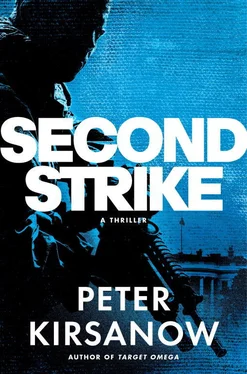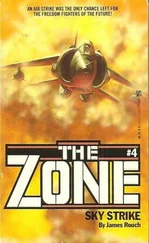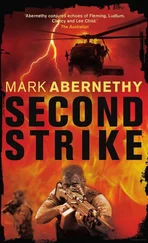While the feeling hadn’t entirely dissipated, it had substantially receded behind feelings of pride and power. He’d ascended to one of the more important positions in Mikhailov’s new Russia. His prospects now were almost as unlimited as those of the genius Egorshin had been. He allowed himself to think of a future of wealth, fame, and women.
All because of the tyrant Stetchkin’s fixation on Tatiana Palinieva. Astonishingly foolish, if somewhat understandable. Palinieva was remarkably attractive. Perhaps now Volkov might draw her interest. After all, if Egorshin could, Volkov could too. And why not? He would possess all the accoutrements of power that he assumed a woman like Palinieva found attractive. He’d make sure to pay his respects at the funeral.
Volkov stood in his station on a low platform at the back of the large plexiglass-enclosed room. His eyes, like those of the dozens of analysts and technicians seated at the sleek ergonomic workstations before him, were fixed on the large digital clock set above the massive movie theater–like screen on the front wall. The screen flashed a blizzard of letters and characters arrayed about innumerable lighted dots on a world map separated into ninety-eight grids. Each member of the unit had been tasked with a specific grid, but all the work for each grid was complete. When all of the digits on the giant clock reached zero, it would be left to Volkov alone to press the command key to set the event in motion. A single key. The program could have self-executed at the appointed time, but Egorshin had wanted to engage the event manually.
Stetchkin was monitoring the proceedings from General Maximov’s office down the long corridor on the same floor. Volkov was relieved that the tyrant wasn’t standing behind his shoulder. As soon as the event had been engaged, Stetchkin would notify Mikhailov and take credit. Volkov had no problem with that. There was enough credit to go around.
As the enormous clock ticked down, a faint murmur spread through the room along with a feeling of anticipation akin to the countdown toward a New Year. Volkov saw slight turns of the head; sidelong glances and smiles proliferated among the unit members. They, too, felt the power of being part of shaping history.
Less than thirty seconds now. As the clock ticked downward, the murmur began to fade to silence. Volkov saw Ludmila Rutina, the attractive analyst from the cyberwarfare division, stare and smile brazenly at him. He returned it with a rakish grin.
Four, three, two… Volkov held his breath, his index finger over the key… Zero. He tapped the key.
The massive screen froze and went completely dark. Nothing. Not a flash or a flicker. Just black.
Bolts of bewilderment and anxiety lanced through Volkov. He pressed the command key again, harder. Nothing happened.
Zero plus two seconds.
He pressed it twice more. Again, no effect.
Zero plus four.
The heads of the personnel in front of him were swiveling back and forth, looking at their teammates, mouthing questions, scanning the screens on their desktops. Hands were shaking.
No answers.
Then, in rapid succession, the monitors on the desktops also froze and went dark. The sounds of confusion and panic rippled through the room. Technicians moved about urgently, looking over shoulders, asking questions, performing diagnostics.
Zero plus twelve, thirteen, fourteen…
Volkov cast about the room, frantically searching the faces of the unit members, looking for anything that might indicate the owner had an answer, a solution. All he found was confusion and disbelief. The best and brightest were stumped.
Volkov frantically pressed the other keys on the board.
Zero plus seventeen. The phone on his desk trilled.
Stetchkin.
Volkov’s body froze, but his mind rocketed into overdrive. Fragments of explanations, images of Uganov and Egorshin, pleas for mercy, all careened and collided in his brain.
The phone trilled again and Volkov stared at the handset. He couldn’t avoid or delay: Stetchkin demanded immediacy. He would expect a definitive explanation. He would want results.
Volkov reached for the handset, wincing in anticipation of the tyrant’s unyielding questions and reproaches. But what he heard astonished him.
“Major, what is the problem? Can this be rectified immediately?”
Gone was the imperiousness and cruelty seemingly ever present in Stetchkin’s tone. The voice on the other end was worried and plaintive. It threw Volkov momentarily off-balance. Nonetheless, so as not to aggravate the tyrant, his response was apologetic and deferential.
“Sir, staff is performing an analysis as we speak. It may take a few moments to determine the cause of the problem and remedy it.”
“It is solvable, however? It is just a matter of time?”
The truth was Volkov had no idea. This should not have happened. Innumerable simulations had been run. All of the potential bugs had been worked out months ago. This was inexplicable, and the perplexed looks on the faces of the technicians scurrying about the room confirmed his belief.
“Without a doubt, sir. We will remedy this. I believe we can do so in short order.”
“Can you give me an estimate of how long?”
“Not precisely, sir. We are working on that.”
“A minute? Five minutes? An hour?”
“Very soon, sir,” Volkov dodged.
“You are confident the event will proceed shortly?”
“I am confident, sir,” Volkov lied.
“Is there anything your unit needs to ensure one hundred percent success?”
Volkov was struck by the servile, almost pleading quality in Stetchkin’s voice. He wasn’t just anxious; he was frightened. The sound was almost as incongruous as hearing a crocodile squeal.
And then Volkov remembered. He had represented to Stetchkin that the event could proceed without Egorshin with one hundred percent certainty. Under normal circumstances the failure of such representation would have doomed Volkov. Stetchkin, however, had made the very same representation to Yuri Mikhailov. Stetchkin, therefore, was no less terrified than Volkov. Thus, for the moment, Stetchkin and Volkov had common interests; they were allies.
Volkov replied, “Sir, we have everything we need. Thank you.”
“Understand that all of the resources of the Russian Federation are at your disposal, Major.”
“Thank you, sir.”
“Good luck. Please notify me the instant the problem has been resolved.”
“I will.”
Volkov would not.
For unbeknownst to either of them, Egorshin had exacted his revenge from the grave, courtesy of his uncle Sergei the magician.
—
It was zero plus fifteen minutes. Not a significant delay, but enough to require adjustment of downstream timetables. Large numbers of troops with massive amounts of equipment and weaponry were poised for a highly coordinated strike. As with any military maneuver, the optimal window for such a strike would not remain open indefinitely. A decision would have to be made soon.
Alexei Vasiliev was the only person in the room with Mikhailov, who had preferred not to be surrounded by a herd of generals and advisors when the event was initiated, all jockeying for position and spewing advice and observations. Mikhailov preferred to drink from a straw rather than a firehose. At critical times, the quality of information was more important than its volume.
Vasiliev was Mikhailov’s chief aide because he understood that principle. He didn’t bother his boss with extraneous ruminations. He spoke sparingly and precisely, and only about things that advanced his boss’s objective.
Mikhailov had sat alone in his office at the time scheduled for the event’s initiation. He knew that any significant developments would be reported by Vasiliev, so he busied himself with a stack of mundane reports about natural gas production and related economic outputs.
Читать дальше












